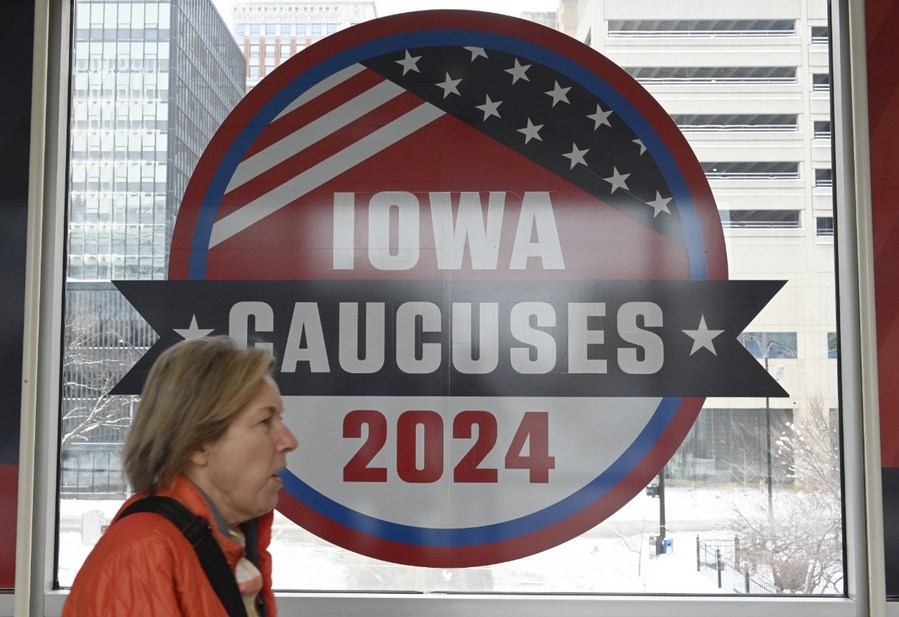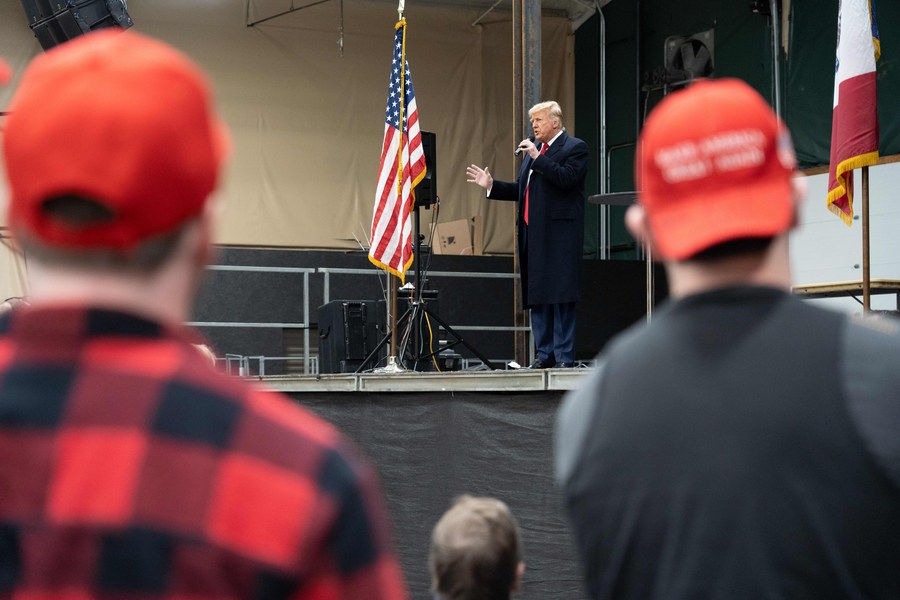Current location:business >>
Uncertainty, anxiety loom over 2024 U.S. presidential election
business334People have gathered around
IntroductionBy Yang Shilong, Liu Yanan (Xinhua) 08:10, January 17, 2024A pedestrian walks past a sign of 2024 Io ...

A pedestrian walks past a sign of 2024 Iowa caucuses in Des Moines, Iowa, the United States, Jan. 15, 2024. (Xinhua)
"Having a former president running changes the election dynamics significantly," an expert on politics said. "The fact that it is Donald Trump adds to this since Trump clearly is signaling his lack of belief in the kind of democratic traditions that have defined the United States throughout its history."
NEW YORK, Jan. 16 (Xinhua) -- Uncertainty and anxiety loom over the 2024 U.S. presidential election as the Iowa caucus on Monday kicked off the official race for the White House.
Only 31 minutes after the caucuses in the Midwestern U.S. state had begun Monday evening, former President Donald Trump was projected to easily win the first major test of the 2024 Republican primary race.
The victory is seen as a boost to Trump's momentum toward a potential rematch in November with the current Democratic President Joe Biden that could likely put the country's institutions to an extreme test.
WHAT MAKES 2024 ELECTION UNIQUE
"Trump has significant control of Republican primary voters and elites, and seems nearly a lock for the nomination," David Redlawsk, James R. Soles professor and chair, Department of Political Science and International Relations, University of Delaware, told Xinhua on Monday.
"This is due to his remaking of the most active parts of the Republican party -- those most likely to vote in primaries. Even if many Republicans (and most Independents) do not really want him, much of the GOP sees him as the only possible option to beat Biden, no matter what his flaws," said Redlawsk.
"The main thing that makes 2024 nearly unique is the fact that a former president defeated in the prior general election is running," he said, adding that the only other time this has happened was in 1892 when Grover Cleveland ran and won, defeating Benjamin Harrison, who had beaten him four years before.
"Having a former president running changes the election dynamics significantly," he said. "The fact that it is Donald Trump adds to this since Trump clearly is signaling his lack of belief in the kind of democratic traditions that have defined the United States throughout its history."
On top of that, the fact that Trump has been indicted on many counts and is facing multiple criminal and civil trials also makes this election "entirely different from any that have come before," said Redlawsk.
There are also efforts trying to remove Trump from the ballot in a handful of states. Colorado's Supreme Court ruled last month that Trump is disqualified from competing in the race under the 14th Amendment's insurrection clause, finding that he violated his oath with his actions around Jan. 6, 2021. Maine's Secretary of State Sheena Bellows also disqualified Trump under the amendment.
But Trump has framed his legal issues as political attacks, arguing he's the victim of a "witch hunt" as he runs for another term.
In the case of Joe Biden, he is the incumbent president and as such the leader of the Democratic Party, according to Redlawsk.
"There was really no one who could (or would) effectively challenge him since he decided he wanted to run again. It is rare for an incumbent to face a serious challenge in his own party so the Democrats have him regardless of voter enthusiasm," he said.

Former U.S. President Donald Trump speaks at a caucus site in Clive, Iowa, the United States, Jan. 15, 2024. (Xinhua)
RESULT OF PARTISAN DYSFUNCTION
"A rematch between two old, disliked candidates is likely to come November and this is a result of partisan dysfunction and fracture," said Samuel J. Abrams, professor of politics at Sarah Lawrence College, and senior fellow at the American Enterprise Institute, in an interview with Xinhua.
"Both parties lack clear platforms or agreement on policies and priorities. Meanwhile, both have active presidents who want the Oval Office and are not thinking about party building and the good of the nation at present," said Abrams. "Trump has no clear successor nor Biden and the race is now about their personalities, not policies and politics."
"Moreover, we have a situation with incredibly low approval of both candidates and no new, real competition, suggesting low engagement and interest and thus low turnout -- so the base that supported Biden, for instance, may not show up this time around. The question is will Trump stir up enough interest in the battleground states to win and it is too early to figure that out," he said.
Abrams warned that "this election is quite dangerous for the nation and I worry about stability."
"On one hand, if Trump wins, he will be aggressive, not work with Democrats, and use the powers of the president to push through his agenda," he said. "While some of his agenda is smart, the fact remains that compromise and shared governance have traditionally promoted stability, and failing to do that has economic, social, and political consequences."
"Should Biden win, he will have to demonstrate that he can set his party on a path forward beyond just beating Trump; how will the Democrats manage the economy, global affairs, civil unrest, etc; how progressive or centrist will they be; who will be the next generations of leaders?" said Abrams.
"I think that regardless of who wins, partisan rancor will continue and we will see unstable majorities emerge such that one party comes into power, becomes fairly extreme and pushes through policy which is unstable and not widely accepted only to be changed by the next administration," said Abrams. "This does not bode well for the future -- it is hard to invest, hard to plan ... and civic life will decline with anxiety rising."
(Zhang Juan contributed to the story.)
Tags:
Reprint:Friends are welcome to share on the Internet, but please indicate the source of the article when reprinting it.“World Wander news portal”。http://greenland.havadist.com/html-64e999921.html
Related articles
Goodbye to Scotland's answer to Liz Truss: How Sturgeon's short
businessHumza Yousaf bowed out as SNP leader today after fewer than 400 crisis and gaffe-filled days in char ...
【business】
Read moreLondon police catch two horses on the loose. Many more are believed to be on the run
businessLONDON (AP) — London police have contained two military horses that were seen running around loose w ...
【business】
Read moreA Greek lawmaker faces criminal charges following a brawl in parliament
businessATHENS, Greece (AP) — Greece’s parliamentary speaker said that he would seek criminal charges agains ...
【business】
Read more
Popular articles
- UN Chinese Language Day celebrated in Tunisia
- A Greek lawmaker faces criminal charges following a brawl in parliament
- Photographer alleges he was forced to watch Megan Thee Stallion have sex, was unfairly fired
- Brian Tobin, former president of the International Tennis Federation, dies at age 93
- DPRK successfully test
- Five Rohingya found dead after Arakan Army arrest — Radio Free Asia
Latest articles
Nadal tested in 3
Nikola Jokic's brother appears to PUNCH a fan in the face after Nuggets' comeback win over Lakers
Alexa Chung puts on a leggy display in a sexy silk co
Thailand warns Myanmar’s rivals against using its soil for harm: ministers — Radio Free Asia
7 Minnesotans accused in massive scheme to defraud pandemic food program to stand trial
Witt's 2
LINKS
- Barry Odom signs 5
- Jazz beats Clippers 110
- He once swore off politics. Now, this Georgia activist is trying to recruit people who seldom vote
- Biden looks to nudge further ahead with Alaska and Wyoming Democratic delegates
- Police looking into how missing fisher went overboard
- Butler hits home run, winning single to lift A's to 2
- Donovan Mitchell scores 33 points, Cavaliers clinch playoff spot with 129
- Donovan Mitchell scores 33 points, Cavaliers clinch playoff spot with 129
- Judge in Trump’s classified files case agrees to protect witness identities
- Anonymous accounts use right